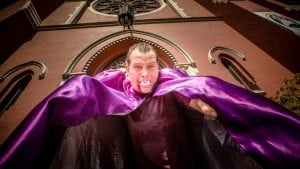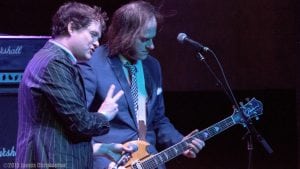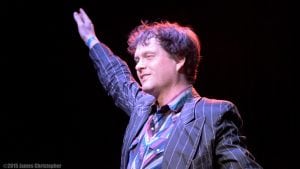
ELECTRIC SIX play The Casbah Mar. 30, The Constellation Room Mar. 31 and Bootleg Theater Apr. 1; photo Cortney Armitage
It’s that time of year again folks, and whether or not the power grids of Southern California can handle the sudden surges of electrical energy, Electric Six are coming to town. Touring in support of their latest musical effort, Fresh Blood for Tired Vampyres, the band will be performing at The Casbah Mar. 30, The Constellation Room Santa Ana Mar. 31, and the Bootleg Theater Apr. 1.
Over the last 14 years, lead singer Dick Valentine (born Tyler Spencer) and his band of electric misfits have been dishing out dance / punk / comedy rock at the prolific pace of an album every year (except for 2004; still impressive). With their latest release in October of last year, we found the band continuing to explore what it means to be a dance-punk band. Fusing their signature in-your-face danciness with healthy doses of 80’s Goth pop, the album promises to be a boogie-fest for the ages. Well, certainly at least for those of us worthy of appreciating their extremely unique and danceable vision.
But Valentine knows that his music isn’t for everyone. In fact, he embraces it. Taking a break from his pre-tour daddy duties (bringing to mind an image which stands in an intriguing contrast to his band’s usual silliness), Valentine sat down for a chat about his music, how he writes it, why he writes it, and the reasons behind his affinity for the strange and nonconforming.
CONCERT GUIDE LIVE: Vampires are so 2010. So that makes me wonder what’s going on with the vampiric theme of your last album? How did this inspiration come about?
DICK VALENTINE: The main thing was that the core of our band, myself, Johnny Na$hinal, Tait Nucleus?, and Da Vė to some degree, we’ve been in the band for some time. And we’re middle aged men. And then all of a sudden we had a rhythm section that, over the course of a year, had left for greener pastures. So we recruited a couple younger dudes to play bass and drums for us, and that was basically the idea. We got this fresh blood riding along with these tired vampires.
CGL: You guys release an album every year. How does that work? What’s the writing process look like?
DV: Well, there’s no one way to do it. The guys in the band who write will send me logic or garageband sketches that I write lyrics to, or if I’m doing it myself, it’s usually done on guitar. I also have a little synthesizer that I work with.
Lyrically, it can start with a title, start with a word. As I go through the day and come up with an idea, I type it in the notes section on my phone. My phone is just filled with little sketches of like three or four words, and then I string them together and get an entire song.
CGL: You seem to be a devout follower of the strange and unconventional. Has this always been the case? When did you realize you could combine your strangeness with music?
DV: Well, for me personally, and without getting too personal, my bubble burst earlier. And you realize, as you see what’s happening to our country, how many people’s bubbles haven’t been burst. I mean, you look at people’s yearbooks and there was never a black person in the class, or they don’t know any gay people, or they don’t think the same, blah blah blah. And when I grew up I went to a very integrated school, went to the city of Detroit as a hipster and realized I wasn’t gonna die, I wasn’t gonna get shot, and ended up getting into music at that point.
So I guess to answer your question, once you realize that things you used to think were taboo, aren’t really taboo, that they’re actually fun and healthy, there’s really no limit to what you can do, as long as nobody gets hurt.
CGL: So then music became a platform for you to express that?
DV: Yeah, to some degree. For me I’ve always gravitated towards lyrics, what you can do with lyrics, and how they’re delivered. So, you know, I wanted the band to be interesting to myself. I firmly believe that if what you’re doing is interesting to yourself, then that’s the first step in making it more interesting for other people. So I know that not everybody’s gonna like our band, but we have enough people that do, so we’ve been able to keep doing it for 15 years.
CGL: Well, I’m glad that it sounds like you’re in touch with the “true inner self.” I think that’s where art is supposed to come from, and if it doesn’t, you can sense it. You hear all the derivative pop music on the radio, and there’s no soul there. At least, that’s how it feels to me.
DV: Yeah, I’ve never ever approached music like, “I know what it takes to get on the radio. I know what it takes to write a hit.” But so many people do, and that’s the end game. We ended up having moderate radio success in the UK for a year, and it was a complete accident. It was a fluke, and that’s the way I always approached it.
Our second album was kind of the one time in the history of this band where it was like, “Oh, you gotta write another ‘Gay Bar’,” and I realized that sitting down to try to do that is something I can’t do.
And also, within that, you look at all the pieces of shit that have been in the radio rotation. And it just proves the point that it’s not the songs, it’s not the songwriting, it’s the fucking radio pluggers. You can’t sit down and write a hit and have it go viral, and everybody loves it on its merits. So I’ve never approached it that way, and I’ve been very, very lucky to have wound up in situation where I can actually sustain myself, and still do what I was doing in 1996.

